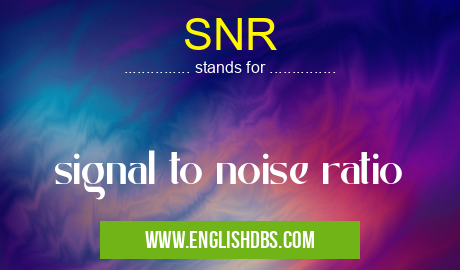What does SNR mean in BRITISH MEDICINE
SNR stands for signal to noise ratio, which is a measurement of the strength of a signal relative to the background noise. It is an important metric in communication systems and audio engineering, where distinguishing signals from noise is the key goal.

SNR meaning in British Medicine in Medical
SNR mostly used in an acronym British Medicine in Category Medical that means signal to noise ratio
Shorthand: SNR,
Full Form: signal to noise ratio
For more information of "signal to noise ratio", see the section below.
Essential Questions and Answers on signal to noise ratio in "MEDICAL»BRITMEDICAL"
What does SNR stand for?
SNR stands for signal to noise ratio.
What is signal to noise ratio?
Signal to noise ratio is a measure of the strength of a signal relative to background noise. The higher the value, the stronger the signal and vice versa.
How is SNR measured?
SNR is measured by comparing the power of a signal (measured in decibels) relative to the power of any unwanted elements such as noise (also measured in decibels). The difference between these two readings gives the signal-to-noise ratio.
Why is signal to noise ratio important?
In communication systems and audio engineering, separating signals from background noises can be difficult. With an adequate understanding of signal-to-noise ratios, it can be easier to distinguish between signals and noises so that adequate sound quality can be maintained and disturbances minimized.
Final Words:
Signal-to-noise ratio (SNR) is an important measurement that helps distinguish between desired signals and undesirable background noises, allowing users to better understand sound quality so they can optimize their communication systems or audio recordings.
